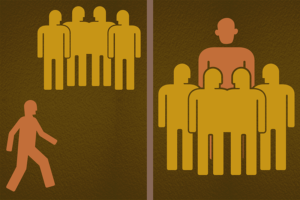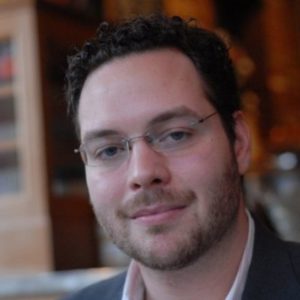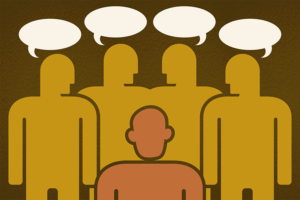
I. How to Make a Connection
-
 By
David Homan
By
David Homan

This is the first of a four part series on how to develop deeper connections. It focuses on the initial research and skills it takes to sustain a new contact beyond the first meeting, as well as how to get that first meeting.
Engaging with a someone new and presenting your strongest self involves two special skills. The first is listening.
Why?
When you are the only one who talks, even if you are the most captivating person on the planet, when you leave this conversation the individual you’re interacting with leaves without feeling they had any value or that you even understood them.
Think of a first date where they other person talks about themselves the whole time. How did that work out for you?
The second is controversial, but it’s about doing your research and knowing what you want. This means you find out what you can online about a person, or from others who know them. Take mental notes on what you have in common. Some people view this as manipulative, but if someone has value and you know and appreciate that, why would they not appreciate a compliment or opportunity to talk to someone in more than a superficial way?
When I meet someone at a conference, I spend a few minutes answering questions about myself, but quickly turn to learn whom they should meet. Anything I can do to “resonate” with them gives me value, and if I help them, then both relationships (between me and the new connection, and my connection and them) are stronger for it.
To get a meeting, you have to understand your values, your goals, and how people see you. For more depth, please read “Setting yourself up to understand your failures.”
But let’s assume for the sake of argument you are ready to start what others call “networking.” You work in the auto industry and want to meet the CEO of Ford.
First off, why does he/she need to take the time to talk to you? What possible value could you add?
There are two ways to get an intro:
One--We often see ourselves in the “stars” before we understand how much experience and hard work it takes to get there, let alone to sustain it. When you look into your contacts and ask for an intro, you have to present yourself and your needs so the person understands your value to them in making the introduction.
Remember that we are constantly in need of new people in our life to affect change. If you seek to make a difference, then no matter who you are, your circle must expand.
Two—With clear goals, you offer a perspective that has value, even though many interactions are random or coincidental and often go nowhere. At any given event or circumstance, if you aren’t aware of the people who work in your field/space, the innovations in the field, or the circumstances that arise, then you will miss countless opportunities. Whether you meet the person you want to accidentally, or purposely through a new contact, if you weren’t ready to be introduced, you may never get the chance again.
Example: Say you really want to meet the CEO of Ford and you’re at an auto event, or just in a conversation with someone at a Starbucks where you were forced to share a table. If you have a perspective on the industry and the person has one as well, listen to them, and then show they you’ve listened by adding your piece, your value to what they’re saying.
If their estimation of you goes up, then the potential they can help you and you them increases as well.
Of course, both these methods are very much in the gray area; and most people are reticent to connect or don’t know how to even ask. That is why this is a skill as much as it is an intuitive field. In a world where we are more increasingly connected, we are also less active because sharing has become passive. We view someone’s post about the birth of their first child differently on Facebook than if they had called and told us. It doesn’t matter that one has all the photos and the story; the personal is the only thing that actually gets things done in the world—remember, the personal.
If you have ambition, and you have goals, then you need to understand your value, how people see you. Then you can spend less time waiting for someone to recognize that you deserve something and more time making connections, and working to become part of the conversation.
I recently met a former US Senator. We had spoken for about 20 seconds previously until someone I was with unfortunately stopped the conversation short. When I met him the next time, I came with the knowledge that someone I knew also knew them well. It was enough to plant the seed, and carry on a longer conversation, but unfortunately not enough to engage him more with me. But even in doing so, it opened up people’s perception of me at the event we were both attending and I met a major powerhouse in my industry who saw me in conversation, albeit a short one.



